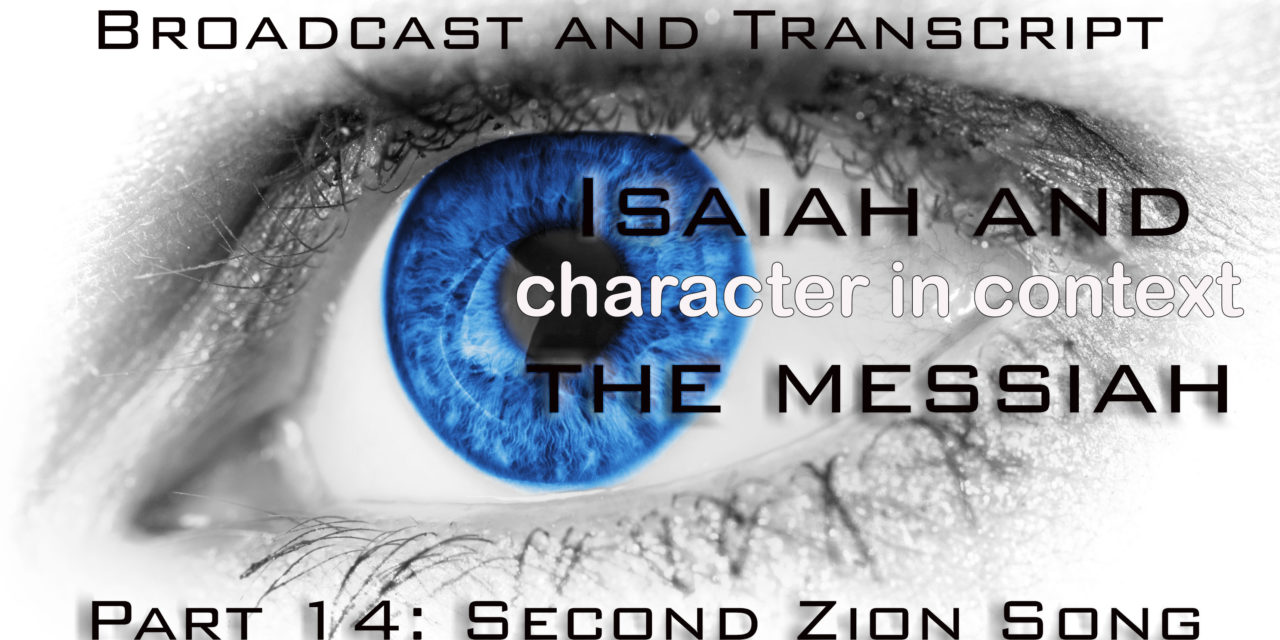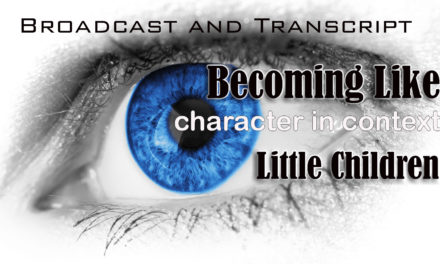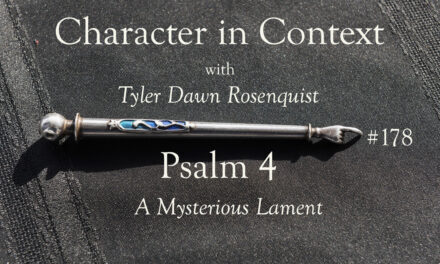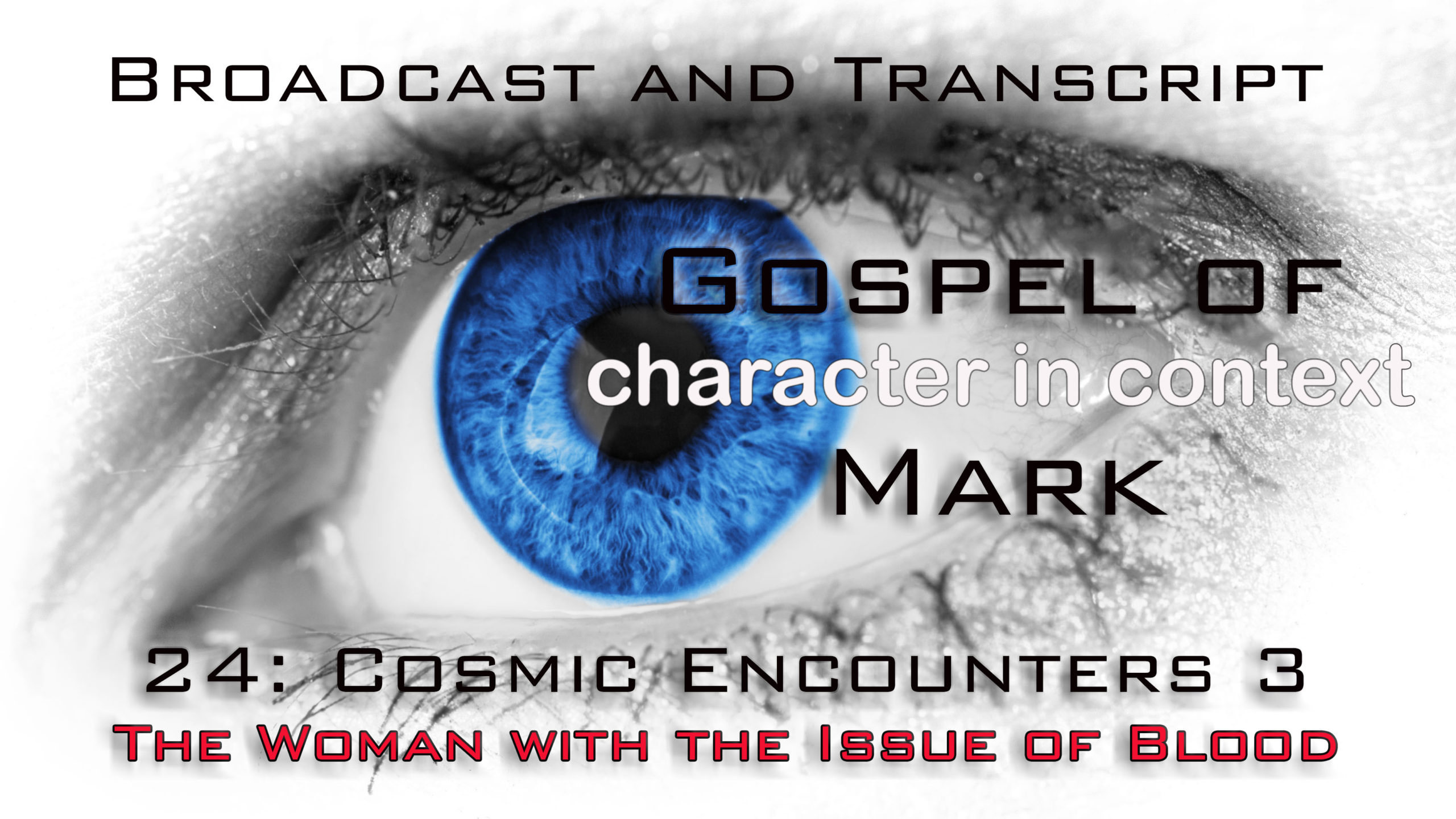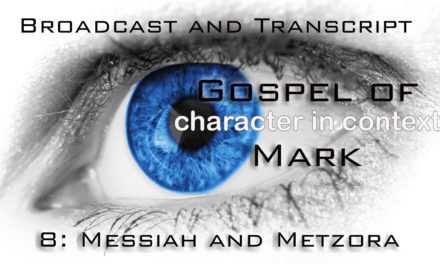This week is very exciting, as we close up the ongoing theme of Yahweh comforting His people and promising them salvation not only from exile but also from the estrangement that exists between them. All of this in preparation for the fourth Servant Song next week—the suffering servant song.
Transcript below, and probably edited even worse than usual because I came down with the flu or something
********************************
Isaiah and the Messiah 14—The Second Zion Song
You should be used to the pattern in Isaiah by now. Yahweh announces an aspect of His salvation, be it through Cyrus or the Servant, and Israel (instead of bursting into praise as Creation does) protests. Well, last week we heard the Third Servant Song and this week—well, we have another complaint and another challenge. We’re just ludicrous, you know, human beings in general. We have a lot more verses this week than last and so we are going to forgo some of the review.
Hi, I am Tyler Dawn Rosenquist and welcome to Character in Context, where I teach the historical and ancient sociological context of Scripture with an eye to developing the character of the Messiah. If you prefer written material, I have five years’ worth of blog at theancientbridge.com as well as my six books available on amazon—including a four-volume curriculum series dedicated to teaching Scriptural context in a way that even kids can understand it, called Context for Kids—and I have two video channels on YouTube with free Bible teachings for both adults and kids. You can find the link for those on my website. Past broadcasts of this program can be found at characterincontext.podbean.com and transcripts can be had for most broadcasts at theancientbridge.com
Throughout this series, I have been quoting from the English Standard Version, the ESV.
Remember last week, we talked about the Great Isaiah Scroll, 1QIsaa, and how the Qumran community in the centuries before Yeshua/Jesus had identified the “arm of the Lord” as the Messiah. That will also be important this week.
9 Awake, awake, put on strength, O arm of the Lord; awake, as in days of old, the generations of long ago. Was it not you who cut Rahab in pieces, who pierced the dragon?
Here, we have the personification of the arm of the Lord, which is exactly why we see the Qumran community identifying this arm, symbolic of a man’s strength, as the Messiah. Israel is the speaker here, and not the prophet. And by personification, just in case it is an unfamiliar term, I mean when a thing or an abstract concept—like victory—is spoken of in terms of being human. We see this all over the Bible with Israel being portrayed as a woman. Babylon was also spoken of as a virgin queen a few chapters ago, wisdom is a woman, and this week we will see Egypt personified as Rahab. In this case, we have the arm of the Lord being credited with great victories just as last week we see the arm of the Lord personified as an individual, saving Zion. The authors of the Great Isaiah Scroll found in the first cave of Qumran saw this arm as the Messiah Himself.
But we have a challenged issued from Israel to the arm of the Lord—“wake up and do the mighty deeds our ancestors talked about!” I am not sure it is in a mocking tone or now, or dripping with sarcasm—impossible to tell for sure—but it is a challenge. “Be the One we have heard so much about!”
10 Was it not you who dried up the sea, the waters of the great deep, who made the depths of the sea a way for the redeemed to pass over?
“Are the stories about the Exodus true? Didn’t you do these things long ago?” What’s it called?—What have you done for me lately?
11 And the ransomed of the Lord shall return and come to Zion with singing; everlasting joy shall be upon their heads; they shall obtain gladness and joy, and sorrow and sighing shall flee away.
IF you do these things, THEN there will be rejoicing. Then we will praise you and acknowledge you did these mighty things. Well, that right there is quite the slap because time and again throughout these salvation oracles, the command has been for Israel to rejoice just because they heard the promise—and here the implication is, “Save us first and THEN we will be happy.” Boy, that doesn’t sound like people nowadays, right? Gosh, we never change…
And here is Yahweh’s response, which is in essence, “You have forgotten that I always win and it is faithless to doubt my history with you.” It’s like a record that keeps skipping, right? Over and over again since Chapter 40. It’s almost embarrassing to read. I am going to take this in sections and not verse by verse because we have repeatedly seen these same messages and we have a lot of material to cover today:
12 “I, I am he who comforts you; who are you that you are afraid of man who dies,
of the son of man who is made like grass,
13 and have forgotten the Lord, your Maker, who stretched out the heavens and laid the foundations of the earth, and you fear continually all the day because of the wrath of the oppressor,
when he sets himself to destroy? And where is the wrath of the oppressor?
14 He who is bowed down shall speedily be released; he shall not die and go down to the pit,
neither shall his bread be lacking.
We have the double emphatic “anoki” which translates as “I, I” and it functions as a strong oath—which is appropriate because this is a salvation oracle. From the first verse of chapter 40 through to this verse, the theme of Yahweh comforting His people, both personally and through the Servant has been repeated. And yet, Israel, as in chapters 1-39 where they were warned to have faith in Yahweh instead of fear of Assyria, and again starting in chapter 40 they are told the same exact thing about Babylon. The phrase “who are you to be afraid of man who dies,” the word for man there is enosh but in the continuation, the parallelism “son of man who is made like grass” the son of man is not ben enosh but ben adam. It is a common thing to assume that certain words in English are automatically certain words in Hebrew, but it isn’t the case. Like last week, when we say adversary, it wasn’t satan and not every time you see anointed does it end up being maschiach.
Here, Yahweh reminds them of His creative power, which no other god can boast—remember that all pagan gods were part of the system and bound by fate—and only Yahweh claimed to be on the outside controlling it all. In light of this, “where is the wrath of the oppressor?” or “Who can be against you if I am for you?” Yahweh will save them, whether they believe it or not.
15 I am the Lord your God, who stirs up the sea so that its waves roar—the Lord of hosts is his name.
16 And I have put my words in your mouth and covered you in the shadow of my hand, establishing the heavens and laying the foundations of the earth, and saying to Zion, ‘You are my people.’”
Remember I told you this was a Zion song? Zion, as an entity, is being addressed here by Yahweh, who reminds Jerusalem of its unique place in history and in His plans. Yahweh, who controls even the chaos of the seas and all the armies of heaven (which is what Yahweh Tzva’ot, Lord of hosts, means) is laying claim to His people, for His own sake and not for theirs. Not because of anything they have or have not done and therefore it is His faithfulness they can depend on and not their own works.
What is the big deal with saying, “You are my people?” Remember Hosea 2:23?
And I will have mercy on No Mercy, and I will say to Not My People, ‘You are my people’; and he shall say, ‘You are my God.’”
We are going to see, in chapter 54 in a couple of weeks, that Yahweh does admit to briefly deserting His people—but it was only for an instant in His anger and was never the end of the story. Now Yahweh is going to turn Zion’s challenges back on to her. This should remind you of when they accused Yahweh of being blind and deaf to their plight and then, chapters later, He turned around and told them that they had it quite backward. Now, remember what they said in verse 9? Awake! Awake!
Now we have a response from, presumably, the prophet who stands in defense of Yahweh’s honor and saving power. This is a wake-up call, no pun intended.
17 Wake yourself, wake yourself, stand up, O Jerusalem, you who have drunk from the hand of the Lord
the cup of his wrath, who have drunk to the dregs the bowl, the cup of staggering.
Wow, not only does Jerusalem need to wake up and stand up, she needs to get a grip on the fact that she isn’t seeing the situation clearly because she is drunk (compromised) by having partaken of the wrath earned by the ancestors of the exiles. Her judgment is seriously being called into account if she thinks she can try to rouse Yahweh from His fictional slumber. Notice we have still not seen a single word of repentance and apology or the taking of any responsibility? Jerusalem and her people are no more qualified to accurately discern what is going on than a drunk on a binge. She sounds a lot like us when we are tired of the consequences of our own actions and start complaining that the enemy is attacking us and God needs to do something. Oh no, baby girl, don’t go there.
18 There is none to guide her among all the sons she has borne; there is none to take her by the hand
among all the sons she has brought up.
In fact, things are so bad that not a single one of the exiles can rise up and be that Davidic king they are longing for. Yahweh has to go and get Cyrus, a pagan foreigner, to reunite them with the Land. But, he can only give them the freedom to return to the Land—Cyrus cannot reconcile them with Yahweh. According to Isaiah 49, that is the future task of the Servant, the Messiah.
19 These two things have happened to you—who will console you?—devastation and destruction, famine and sword; who will comfort you?
I know this looks strange, it says “these two things have happened to you” and then goes on to list four things, but this is poetic parallelism. Devastation and destruction are equated with famine and sword. But we see, again, the theme of comfort and consolation. Who will do that for them? Not one of their own.
20 Your sons have fainted; they lie at the head of every street like an antelope in a net;
they are full of the wrath of the Lord, the rebuke of your God.
Why can’t Yahweh raise up a savior from among the sons of Zion? Here the prophet paints the most insultingly weak and pathetic picture of the exiles. They can’t even save themselves, much less one another and certainly not the world. Yahweh’s punishment did it’s work and left the Israelites broken to the point that they could not do anything to save themselves. Yahweh needed them to see that He alone was their God, and that they should never have turned to idols or to other military powers to help them.
21 Therefore hear this, you who are afflicted, who are drunk, but not with wine:
22 Thus says your Lord, the Lord, your God who pleads the cause of his people: “Behold, I have taken from your hand the cup of staggering; the bowl of my wrath you shall drink no more;
23 and I will put it into the hand of your tormentors, who have said to you, ‘Bow down, that we may pass over’; and you have made your back like the ground and like the street for them to pass over.”
Awesome status reversal here and we have another speaker change from the prophet to Yahweh speaking for Himself. You have been afflicted. You have been drunk from the aftereffects of my wrath—but no more. I am curing you of all that and you will never have to deal with that kind of wrath from me again. I will oppress those who oppressed you. I will take the power from those who took the power from you.
This is all honor/shame language here. “Bow down that we may pass over” is a direct reference to something we see in ancient near eastern throne rooms. On the walls would be depicted their kings walking over the top of conquered peoples and conquered kings in particular, and footstools would often have depictions of conquered kings on them so that the victor could rest his feet on top of them. As the bottom of the foot was considered the most disgusting part of a person’s body, to be underfoot was to experience the greatest shame imaginable. And if you would like to read an article about that, Academia.edu has an article by Dr. Lodewyk Sutton called “A Footstool of War, Honour and Shame? ” Perspectives Induced by Psalm 110:1 available here: https://www.academia.edu/34753927/_A_FOOTSTOOL_OF_WAR_HONOUR_AND_SHAME_PERSPECTIVES_INDUCED_BY_PSALM_110_1 and there are some great illustrations to show you what I am talking about here. Also, if you have ANEP by Pritchard, which is commonly used shorthand in scholarly sources for The Ancient Near East in Pictures, and there is also a companion volume the ANET, The Ancient Near East in Texts. Anyway, if you get a copy and check out the pictures, you can see this sort of thing. I highly recommend it, it isn’t too pricey and it really opens up a lot of this language.
Now that we have had notice given of their impending status reversal from shamed to honored status, now Yahweh’s tone changes in 52:1-11. This is an announcement ripe with anticipation, promise, and hope. I am going to read the whole thing and then we will deconstruct it.
52 Awake, awake, put on your strength, O Zion; put on your beautiful garments, O Jerusalem, the holy city; for there shall no more come into you the uncircumcised and the unclean.
2 Shake yourself from the dust and arise; be seated, O Jerusalem; loose the bonds from your neck,
O captive daughter of Zion.
3 For thus says the Lord: “You were sold for nothing, and you shall be redeemed without money.” 4 For thus says the Lord God: “My people went down at the first into Egypt to sojourn there, and the Assyrian oppressed them for nothing. 5 Now therefore what have I here,” declares the Lord, “seeing that my people are taken away for nothing? Their rulers wail,” declares the Lord, “and continually all the day my name is despised. 6 Therefore my people shall know my name. Therefore in that day they shall know that it is I who speak; here I am.”
7 How beautiful upon the mountains are the feet of him who brings good news, who publishes peace, who brings good news of happiness, who publishes salvation, who says to Zion, “Your God reigns.”
8 The voice of your watchmen—they lift up their voice; together they sing for joy; for eye to eye they see the return of the Lord to Zion.
9 Break forth together into singing, you waste places of Jerusalem, for the Lord has comforted his people; he has redeemed Jerusalem.
10 The Lord has bared his holy arm before the eyes of all the nations, and all the ends of the earth shall see the salvation of our God.
11 Depart, depart, go out from there; touch no unclean thing; go out from the midst of her; purify yourselves, you who bear the vessels of the Lord.
12 For you shall not go out in haste, and you shall not go in flight, for the Lord will go before you, and the God of Israel will be your rear guard.
Okay, isn’t that gorgeous? Let’s go through it in context:
52 Awake, awake, put on your strength, O Zion; put on your beautiful garments, O Jerusalem, the holy city; for there shall no more come into you the uncircumcised and the unclean.
Third mention of “awake, awake!” and we might have missed the connection with Isaiah 51 if we did these studies chapter by chapter. This time it is more of a clarion call. Respond to your deliverance! Put on the festival garments, Jerusalem, for the invaders have been invaded! The verse says, “for no more shall enter into you the uncircumcised and unclean” and we could take this for referring to the world to come, but given the content of the rest of the section, that is unlikely. The reference to the uncircumcised and unclean cannot be taken too literally, poetically this means that the invaders are expelled, but there has never been a time historically where people who were uncircumcised were barred from Jerusalem and obviously, people lived there so you could never keep the unclean out. I mean, all sorts of things—both terrible and wonderful—make one unclean. Unclean is not the problem, going to the Temple in an unclean state is the only problem as per Torah. And at this point, they are all unclean from corpse impurity and until they can get red heifer water, they will remain in that state—just as we are today, the most serious type of ritual uncleanness.
2 Shake yourself from the dust and arise; be seated, O Jerusalem; loose the bonds from your neck, O captive daughter of Zion.
“Shake yourself from the dust and arise”—this is the opposite of Yahweh’s command to the virgin daughter of Babylon who was seated on a throne. In 47:1, Babylon was told to sit in the dust without a throne—a sign of status reversal, going from honored to shamed, and of being in mourning, sitting in the dust. Here, the captive daughter of Zion is told to come out of mourning and arise to be seated, presumably on a throne or another place of honor. She is being told to be proactive, to begin to act as someone who is about to go home. Start packing!
3 For thus says the Lord: “You were sold for nothing, and you shall be redeemed without money.”
Again, for those of you who have been following along with all the episodes, this is a direct link back to 50:1. “…which of my creditors is it to whom I have sold you? Behold, for your iniquities you were sold”… and to 45:13 “I have stirred him up in righteousness, and I will make all his ways level; he (Cyrus the Great) shall build my city and set my exiles free, not for price or reward,” says the Lord of hosts.” Yahweh was not in debt that He needed to sell off His family members to creditors. BUT, He has promised to redeem and redeem He will but it will be without money. When Cyrus sent them home, He was not paid to do it. When Yeshua reconciled us with God, it was also without money. For that matter, when the children of Israel were redeemed from slavery in Egypt, again, no money involved. This is a Scriptural pattern, fulfilled in different ways, that shows His character and His nature to redeem. We need to remember that always—His character is inherently redemptive. It is actually what He wants to do. He wants it not only for us but also for our enemies. Until we get that through our thick skulls, we will always worship a pale shadow of Him but once we begin to understand it, He can start to strip us of our own hatred and prejudices.
4 For thus says the Lord God: “My people went down at the first into Egypt to sojourn there, and the Assyrian oppressed them for nothing. 5 Now therefore what have I here,” declares the Lord, “seeing that my people are taken away for nothing? Their rulers wail,” declares the Lord, “and continually all the day my name is despised. 6 Therefore my people shall know my name. Therefore in that day they shall know that it is I who speak; here I am.”
As you can imagine, there is a lot of debate about these verses because the wording is anything but crystal clear. There are some vague references to people and groups that are not specified, so let me just rephrase it the way I think it should go. In any event, no matter how you choose to go on this, it doesn’t really change anything of eternal significance. I will add some words for clarity and change some pronouns.
4 For thus says the Lord God: “My people went down at the first into Egypt to sojourn there and were oppressed as slaves, and many years later the Assyrian oppressed them for nothing. 5 Now therefore what do I have here??” declares the Lord, “considering the fact that my people are taken away for nothing? The powerless rulers of my people wail,” declares the Lord, “and continually all the day my name is despised because their captivity makes me look defeated. 6 Therefore, when they are set free and go home in triumph, my people shall know my name. Therefore, in that day they shall know that it is I who speak; here I am.”
Really, all I did was to mesh this section with what has gone before. Yahweh’s repeated statements that when Israel as a nation returns from exile, something that has never been done before, that everyone will marvel at it. That He will be glorified and honored in sight of the whole world. It is possible that the rulers who are wailing are Babylon’s rulers but then that doesn’t go well with what comes after.
Now, we get to some really good stuff, what could be called a bookend to Isaiah 40:9-11. Here’s that passage before we get to this week’s materials:
9 Go on up to a high mountain, O Zion, herald of good news; lift up your voice with strength, O Jerusalem, herald of good news; lift it up, fear not; say to the cities of Judah, “Behold your God!”
10 Behold, the Lord God comes with might, and his arm rules for him; behold, his reward is with him, and his recompense before him.
11 He will tend his flock like a shepherd; he will gather the lambs in his arms; he will carry them in his bosom, and gently lead those that are with young.
Remember, this was the big initial “comfort, comfort my people” chapter. And this is the last great hurrah before the climactic fourth Servant Song, which really highlights the suffering servant motif even more than the third, and which was only hinted at in the second.
7 How beautiful upon the mountains are the feet of him who brings good news, who publishes peace, who brings good news of happiness, who publishes salvation, who says to Zion, “Your God reigns.”
Feet in the ancient world were normally super gross, and so to call feet beautiful is an indication of the blessed nature of the news they carry—good news, one of the only twenty-nine occurrences of besar in the Hebrew Scriptures. Jerusalem is receiving news that she will no longer be empty, no longer estranged from her God. Salvation (Heb yeshua) is coming and her God will be her King. Shalom—completeness, wholeness, things as they should be—will be the order of the day.
Remember that, at a later date, Yahweh would say this to Haggai the post-exilic prophet about the Second Temple, which unlike the first never had the glory of God resting upon it:
2: 9 “The latter glory of this house shall be greater than the former, says the Lord of hosts. And in this place I will give peace, declares the Lord of hosts.’”
The good news, Yeshua is coming and, as we will see next week in the fourth Servant song, He would bring our peace.
53:5 But he was pierced for our transgressions; he was crushed for our iniquities; upon him was the chastisement that brought us peace, and with his wounds we are healed.
This is the reason we are covering Isaiah 40-55, all of it, before studying Mark—because we must understand the context from which it was written. The idea that “Your God reigns” and that His reign was on full display in the ministry of the Servant, Yeshua the Messiah, Jesus the Christ. Without Isaiah 40-55 we miss so much of what Mark was communicating in terms that would be fully understood within first-century Judaism. And Mark will even draw upon this verse in his first chapter.
In Isaiah 40:9 it says, “lift up your voice with strength, O Jerusalem, herald of good news; lift it up, fear not; say to the cities of Judah, “Behold your God!” and 52:7 echoes that with “who brings good news of happiness, who publishes salvation, who says to Zion, “Your God reigns.” This is no accident. These are bookends situated right before the grand climax of deutero-Isaiah.
8 The voice of your watchmen—they lift up their voice; together they sing for joy; for eye to eye they see the return of the Lord to Zion.
It was the job of watchmen in the ancient world to stand up on the wall looking for incoming messengers or threats, things they can see with their own eyes. They would not report tumbleweed sightings. They wouldn’t report wild rumors. Their lives depended on the truthfulness and dependability of what they were reporting. This was a serious position of trust. A watchman who reports wrong a couple of times isn’t going to be a watchman for long and probably won’t live very long. But these aren’t giving “rapture reports” on social media. They see the return of the Lord to Zion with their own eyes. No guesswork involved.
9 Break forth together into singing, you waste places of Jerusalem, for the Lord has comforted his people; he has redeemed Jerusalem.
Again, comfort and redemption. Coupled with the next few verses, this comes across as a liturgical procession. This is not a secular celebration, but the regathering of the religious community because the Temple will be rebuilt and they can resume their cultic activities in honor of Yahweh. Remember there was no separation of church and state, they were entirely spiritual beings and being separated from being able to worship their own God at His own Temple was a devastating blow for the community. This would be more important for them than we moderns can even imagine.
10 The Lord has bared his holy arm before the eyes of all the nations, and all the ends of the earth shall see the salvation of our God.
Here is another reason why the Qumran sect identified the “arm of the Lord” as the Messiah who they believed would appear very soon. However, whereas, in retrospect, we see the saving work of Yeshua in bringing the Gospel to the ends of the earth through His redeemed followers, they interpreted this verse as the ends of the earth (and especially the Sadducees and Pharisees) seeing the vengeance that God was going to bring on everyone except for the Qumranites.
11 Depart, depart, go out from there; touch no unclean thing; go out from the midst of her; purify yourselves, you who bear the vessels of the Lord.
A lot of teachers really mangle this—and especially when they don’t understand ritual purity and the Temple services. Listen, they were all unclean with corpse impurity. This is specifically telling them to leave an inherently unclean place—Babylonia. I have heard people say that this was telling the priests (to whom this command was directed as they were the only ones permitted to touch the holy vessels, which were themselves defiled at this point) not to get near menstruating women. You know, as though marital sex didn’t make one unclean. No, they all had the big kahuna of impurity from having not been cleansed of death over the previous (at least) seventy years. When it said to purify themselves, well, getting out of dodge was the first step. This is a process. Get out of Babylon. Rebuild the mikvaot, the ritual baths, rebuild the altar, start the journey toward ritual restoration and religious purity in trusting only Yahweh. This couldn’t happen overnight.
12 For you shall not go out in haste, and you shall not go in flight, for the Lord will go before you, and the God of Israel will be your rear guard.
This procession would be utterly unlike the first Exodus. They wouldn’t be on the run or in danger—BUT, Yahweh would still be their front and rear guard. Some things change, but others never will.

